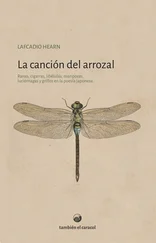Table of Contents
There was a falconer and hunter, named Sonjo, who lived in the district called Tamura-no-Go, of the province of Mutsu. One day he went out hunting, and could not find any game. But on his way home, at a place called Akanuma, he perceived a pair of oshidori (1) (mandarin-ducks), swimming together in a river that he was about to cross. To kill oshidori is not good; but Sonjo happened to be very hungry, and he shot at the pair. His arrow pierced the male: the female escaped into the rushes of the further shore, and disappeared. Sonjo took the dead bird home, and cooked it.
That night he dreamed a dreary dream. It seemed to him that a beautiful woman came into his room, and stood by his pillow, and began to weep. So bitterly did she weep that Sonjo felt as if his heart were being torn out while he listened. And the woman cried to him: "Why,—oh! why did you kill him?—of what wrong was he guilty?... At Akanuma we were so happy together,—and you killed him!... What harm did he ever do you? Do you even know what you have done?—oh! do you know what a cruel, what a wicked thing you have done?... Me too you have killed,—for I will not live without my husband!... Only to tell you this I came."... Then again she wept aloud,—so bitterly that the voice of her crying pierced into the marrow of the listener's bones;—and she sobbed out the words of this poem:—
Hi kurureba
Sasoeshi mono wo—
Akanuma no
Makomo no kure no
Hitori-ne zo uki!
("At the coming of twilight I invited him to return with me—! Now to sleep alone in the shadow of the rushes of Akanuma—ah! what misery unspeakable!") (2)
And after having uttered these verses she exclaimed:—"Ah, you do not know—you cannot know what you have done! But to-morrow, when you go to Akanuma, you will see,—you will see..." So saying, and weeping very piteously, she went away.
When Sonjo awoke in the morning, this dream remained so vivid in his mind that he was greatly troubled. He remembered the words:—"But to-morrow, when you go to Akanuma, you will see,—you will see." And he resolved to go there at once, that he might learn whether his dream was anything more than a dream.
So he went to Akanuma; and there, when he came to the river-bank, he saw the female oshidori swimming alone. In the same moment the bird perceived Sonjo; but, instead of trying to escape, she swam straight towards him, looking at him the while in a strange fixed way. Then, with her beak, she suddenly tore open her own body, and died before the hunter's eyes...
Sonjo shaved his head, and became a priest.
Table of Contents
A long time ago, in the town of Niigata, in the province of Echizen, there lived a man called Nagao Chosei.
Nagao was the son of a physician, and was educated for his father's profession. At an early age he had been betrothed to a girl called O-Tei, the daughter of one of his father's friends; and both families had agreed that the wedding should take place as soon as Nagao had finished his studies. But the health of O-Tei proved to be weak; and in her fifteenth year she was attacked by a fatal consumption. When she became aware that she must die, she sent for Nagao to bid him farewell.
As he knelt at her bedside, she said to him:—
"Nagao-Sama, my betrothed, we were promised to each other from the time of our childhood; and we were to have been married at the end of this year. But now I am going to die;—the gods know what is best for us. If I were able to live for some years longer, I could only continue to be a cause of trouble and grief for others. With this frail body, I could not be a good wife; and therefore even to wish to live, for your sake, would be a very selfish wish. I am quite resigned to die; and I want you to promise that you will not grieve... Besides, I want to tell you that I think we shall meet again."...
"Indeed we shall meet again," Nagao answered earnestly. "And in that Pure Land there will be no pain of separation."
"Nay, nay!" she responded softly, "I meant not the Pure Land. I believe that we are destined to meet again in this world,—although I shall be buried to-morrow."
Nagao looked at her wonderingly, and saw her smile at his wonder. She continued, in her gentle, dreamy voice,—
"Yes, I mean in this world,—in your own present life, Nagao-Sama... Providing, indeed, that you wish it. Only, for this thing to happen, I must again be born a girl, and grow up to womanhood. So you would have to wait. Fifteen—sixteen years: that is a long time... But, my promised husband, you are now only nineteen years old."...
Eager to soothe her dying moments, he answered tenderly:—
"To wait for you, my betrothed, were no less a joy than a duty. We are pledged to each other for the time of seven existences."
"But you doubt?" she questioned, watching his face.
"My dear one," he answered, "I doubt whether I should be able to know you in another body, under another name,—unless you can tell me of a sign or token."
"That I cannot do," she said. "Only the Gods and the Buddhas know how and where we shall meet. But I am sure—very, very sure—that, if you be not unwilling to receive me, I shall be able to come back to you... Remember these words of mine."...
She ceased to speak; and her eyes closed. She was dead.
* * * * *
Nagao had been sincerely attached to O-Tei; and his grief was deep. He had a mortuary tablet made, inscribed with her zokumyo; (1) and he placed the tablet in his butsudan, (2) and every day set offerings before it. He thought a great deal about the strange things that O-Tei had said to him just before her death; and, in the hope of pleasing her spirit, he wrote a solemn promise to wed her if she could ever return to him in another body. This written promise he sealed with his seal, and placed in the butsudan beside the mortuary tablet of O-Tei.
Nevertheless, as Nagao was an only son, it was necessary that he should marry. He soon found himself obliged to yield to the wishes of his family, and to accept a wife of his father's choosing. After his marriage he continued to set offerings before the tablet of O-Tei; and he never failed to remember her with affection. But by degrees her image became dim in his memory,—like a dream that is hard to recall. And the years went by.
During those years many misfortunes came upon him. He lost his parents by death,—then his wife and his only child. So that he found himself alone in the world. He abandoned his desolate home, and set out upon a long journey in the hope of forgetting his sorrows.
One day, in the course of his travels, he arrived at Ikao,—a mountain-village still famed for its thermal springs, and for the beautiful scenery of its neighborhood. In the village-inn at which he stopped, a young girl came to wait upon him; and, at the first sight of her face, he felt his heart leap as it had never leaped before. So strangely did she resemble O-Tei that he pinched himself to make sure that he was not dreaming. As she went and came,—bringing fire and food, or arranging the chamber of the guest,—her every attitude and motion revived in him some gracious memory of the girl to whom he had been pledged in his youth. He spoke to her; and she responded in a soft, clear voice of which the sweetness saddened him with a sadness of other days.
Then, in great wonder, he questioned her, saying:—
"Elder Sister, so much do you look like a person whom I knew long ago, that I was startled when you first entered this room. Pardon me, therefore, for asking what is your native place, and what is your name?"
Immediately,—and in the unforgotten voice of the dead,—she thus made answer:—
"My name is O-Tei; and you are Nagao Chosei of Echigo, my promised husband. Seventeen years ago, I died in Niigata: then you made in writing a promise to marry me if ever I could come back to this world in the body of a woman;—and you sealed that written promise with your seal, and put it in the butsudan, beside the tablet inscribed with my name. And therefore I came back."...
Читать дальше











